FTC Disclosure: Delicious Obsessions may receive comissions from purchases made through links in this article. As an Amazon Associate I earn from qualifying purchases.Read our full terms and conditions here.
One of my primary goals in my work as a coach is to help women learn how to trust themselves around food again. This will automatically help them shift their relationship with their body and their confidence in themselves to make the best decisions they can for their own personal health. This is an area that I am crazy passionate about because it stems from the dark place where I spent much of my life in relationship to food and my body.
It’s a miserable place to live. A place that literally sucks the life out of you, leaving you with nothing else to give to yourself, your family, or the world.
This area of discussion can be very complex and overwhelming for people, especially if they have spent countless years (or decades) in a relationship to food and body that feels disconnected and disempowered. Working through all of these complexities is far more than I could ever write in one single blog post, but today I am going to go over the fundamentals of why we are in this place to start with and how you can begin shifting your current relationship with food and body into a healthier place.
When I work with my clients around shifting their relationship with food, it is all about bringing the power back to the woman. It is about making her right, meeting her where she is, and letting her know that her unwanted behaviors around food and body are not wrong and not her fault.
This topic is often sensitive and many times people don’t want to hear it. But it’s important and it needs to be discussed. And discussed. And discussed some more until we can FINALLY start bringing about some real shifts in the world.
Body Hate is a Crisis of Epic Proportions
If you Google “women body hate” you’re going to get A LOT of results. Way more than I could ever go through, so for the sake of time, I chose just a handful of statistics to share in this post.
One survey of more than 45,000 women found that almost 60 percent said they ‘hated’ the way they looked (source). In another survey, more than 75 percent of women did not like the way they looked (source). And before you say anything, the remaining 25 percent are not sitting around singing their body’s praises…one survey found that only 4 percent were ‘completely happy’ (source).
So, that means 96% of all women either hate their body or dislike it to some degree. And this is not just adult women either. This is affecting our children. Our sweet baby girls. Another article stated:
Girls as young as 7 years old struggle with poor body confidence, according to the Girls’ Attitudes Survey 2016, commissioned by the Girl Guides. Some 40 percent of 7- to 10-year-olds sometimes felt ashamed or embarrassed about their bodies, with 15 percent feeling this way most of the time.
This statistic is sad enough in itself, but just 10 years later the figures rocket upwards. Among 17- to 21-year-olds, 78 percent felt that same shame and embarrassment (50 percent most of the time). The survey highlights the pressures felt from a young age – that girls feel they are not pretty enough, thin enough or perfect.
On a side note, let’s define the word “hate”, shall we, because I think we forget what a powerful word this is. According to Miriam Webster, hate is defined as:
Intense hostility and aversion usually deriving from fear, anger, or sense of injury. Extreme dislike or disgust.
Our women and girls are walking around feeling INTENSE HOSTILITY AND AVERSION to their bodies!!!!!!!!
Let that sink in for a minute.
People, we have a crisis on our hands here. We have a sad, sad thing happening in the world. Our girls and women are in a state of desperation like no other time in history. What makes this crisis so dire is the fact that it is ACCEPTED, ENCOURAGED, and considered NORMAL!!!!
This makes me want to cry. And then it makes me angry. Really, really angry.
Think of all that energy, all that talent, all that goodness that these girls and women could give to the world if they didn’t feel that they needed to worry about how their body looked, and by default, what they put in their mouths.
Think of the incredible changes that could be brought forward in the world if the energy women spent loathing themselves and micromanaging their dinner plate was put to a more productive use?
Wouldn’t it be amazing?
We Have Been Conditioned to Hate (and not trust) Ourselves
Our unwanted behaviors around food (i.e. binging, overeating, “emotional” eating, etc.) are not our fault. Neither is the hatred and disgust that many of us feel towards our body. We did not create these problems, nor are they unique to us. Yes, we are each unique and our journey will reflect that…but I am here to tell you that there is not a single thing you are experiencing right now that someone else has not experienced before, or is currently experiencing right now.
Why do we have these issues in the first place?
The answer is simple: the diet industry.
According to Marketdata, the total U.S. weight loss market is currently worth $66.3 billion, with a projected total market value of $245 billion by 2022. Every day there are new diets, new exercise programs, new foods, new supplements, and new this-that-and-the-other-thing that hit the market. All in the hopes of helping people “achieve their dreams” by losing weight. (source 1, source 2)
But here’s the fact. If diets worked, then we would all have the “perfect” body and life would be amazing. I mean, the diet advertisers all promise us that we will finally be good enough and happy enough once we just lose those extra pounds…with the help of their product, of course.
Ummm, yeah. Anyone noticing one little thing that seems off here?
These diets don’t seem to work. As a society, our weight continues to increase, despite our best efforts to diet and “control” ourselves around food. And the argument that people are simply willpower weaklings doesn’t cut it for me.
Am I the only one who thinks we’ve been lied to in the name of profits? I mean, if the latest fad diet actually worked then these companies would be out of business. And with billions of dollars on the line, that simply cannot happen.
So I am here today to tell you something that I want you to repeat over and over and over until you really get it. I want you to print it out and hang it on your mirror. I want you to shout it from the rooftops:
YOU DID NOT FAIL THE DIET! THE DIET FAILED YOU!!!!!!!!!!!!!!!!!!!!!!!!
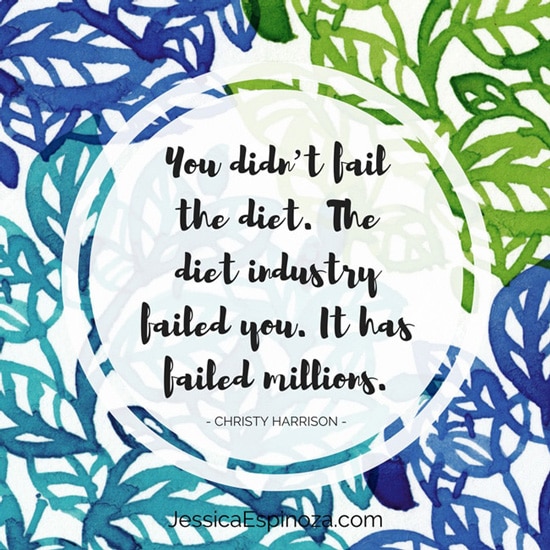
Did you know that almost everyone (95-97 percent) of people who lose weight on a weight loss diet regain that weight, and in most cases gain MORE weight? Only a small percentage of people (1-3 percent) manage to keep weight lost in a diet off long-term, but that either comes with some sort of powerful internal shift OR it comes with more and more restrictive dieting for the rest of their life.
All that said, the diet industry has done one thing really, really well. They have expertly conditioned us to feel a certain way. And those conditioned feelings tell us that:
- we are failures
- we are willpower weaklings
- we cannot possibly trust ourselves when it comes to food (or anything else)
I’d like to ask: if we can’t trust ourselves, then who can we trust?
Micromanaging Your Food = Lack of Trust in Your Body
Anytime you are dealing with unwanted issues around food and body, there is going to one thing that is certain — you do not trust yourself and your body. You don’t trust the body’s built-in signals and mechanisms that are there to keep it sane, nourished, and healthy. Those mechanisms are there. I promise.
Every day you feel like there is no way you can trust yourself around certain foods. You have a long list of “good” and “bad” foods that you adhere to. You’ve been told what to eat by the powers that be and you know for a fact that x, y, and z foods are the devil and must never, ever, EVER be consumed.
You micromanage your calories, fat grams, and carbs. You make sure you exercise a certain amount, in a certain way, every day so that you can “work off” those extra calories you may have eaten. And, if you “indulge” in a piece of cake? Well, you simply punish yourself by tacking on an extra 30, 60, or 90 minutes of cardio to make sure you keep your calories in a deficit. (I mean, how dare you have a life and enjoy the pleasureful experience of cake?)
There is zero fun in food anymore. Zero pleasure. Food becomes boring and cooking becomes drudgery. You eat the same things over and over again because it’s easier than trying to count the macros for a new meal.
You bounce around from diet to diet depending on what the latest research is showing as the “ideal” way to eat. You are constantly seeking a way to lose weight and keep it off. You are confident that *this* diet will be “the one”.
You do great on a diet for a short period of time (or even a long period of time in some cases) only to be hit with an overwhelming urge to eat anything and everything in your path.
And then you wake up in a puddle of shame and self-hate and start the cycle all over again.
Again, this is not your fault. This is just what you’ve been conditioned to do. You do all this, at a very subconscious level, because at least when you are controlling things like calories, fat grams, and carbs, you feel like you are in control of your life and your health.
A large number of people even feel that they are “addicted” to food and that makes them feel even more out of control and out of touch with their inner wisdom. I wrote a long post about why the “food addiction” mentality is really detrimental to our physical and mental health here.
Restriction mindset can be detrimental. The human brain will always want what it can’t have. If you put a food on the “forbidden” list, the body is immediately going to want to eat that food. And in large amounts because it thinks that it will never, ever be able to eat it again so it better get as much in as possible before you take it away.
Then, if you restrict your diet too much (i.e. severely limiting calories, fat, or carbs), then your body will go into starvation mode because it thinks that it is in the middle of a famine and is not sure when it will get fed again. From there, your health begins to suffer because you are no longer fully nourished, you’re missing out on vital vitamins and minerals, and the stress of micromanaging it all is feeding into inflammation and other dis-ease in the body.
Reclaiming Your Power and Trust In Yourself
As I said at the very beginning of this post, I am all about helping women reclaim their power and their energy. We give away so much power to a number on a scale. We clutter up our minds worrying about how we look or what foods we can or cannot eat. We use up so much energy punishing ourselves with exercise and negative self-talk.
All of these behaviors stem from a lack of trust in ourselves and this incredibly amazing thing called the human body. You see, the human body is awesomely and wonderfully made. Within us, we have all the mechanisms we need to help keep our weight balanced and in a zone that our body deems as a good set point for it. It’s all there, deep within our brains and our physiology. We are not designed to micromanage our nutrition to the level that we do today.
But, these mechanisms have been hijacked, overpowered, re-wired, and taken offline for so many of us. This can happen for a number of reasons, but the main driving force (in my opinion) was the industrial revolution that started bringing highly refined and processed foods to our pantries and dinner tables. In the last 100 years, our access to food of all types has skyrocketed, while food quality and nutritional wisdom has plummeted.
But this is a totally different discussion and one that I don’t want to digress into for this post.
I don’t often like to use the word “hate” because of the power that word holds, but if there is one thing I do hate it’s diets. And when I use the word “diets” it is referring to what we all think of as a “diet” — some sort of plan that artificially restricts certain macronutrients in order to micromanage the number on a scale.
I never recommend diets. I don’t even like using the word diet. If we have to define what we eat, I would prefer to use “style of eating”. But ultimately, I’d like for us to just get rid of the labels completely and just eat real food and nourish our bodies. That is why I prefer to rely on something called “intuitive eating”.
Simply put, “intuitive eating” is an approach that helps people learn to listen to their bodies and honor the cues they give us for hunger, satiety, fullness, and pleasure. There are a variety of definitions of this style of eating out there, but my personal definition of “intuitive eating” is:
Eating in a way that nourishes our mind, body, and soul while honoring and respecting our own individual dietary needs (and never with shame, guilt, or ethical confusion).
For me, intuitive eating is about removing the moral value of a food — i.e. this food is “good” therefore I am good if I eat it OR this food is “bad” therefore I am bad if I eat it — and learning how to listen to our body and give it what it needs from an empowered place.
Intuitive Eating Leads to Self-Trust, Peace, Freedom, and Happiness
Intuitive eating can often be confusing for people because we are used to following a set of rules when it comes to food (“good” foods and “bad” foods, this many calories and that many carbs). It can feel scary because we have been conditioned to believe that we cannot trust ourselves around food and if we remove our long-standing rules then all hell will break loose. But at the same time, it is incredibly empowering.
Before we begin, because I have so many readers who are dealing with chronic illness (myself included) a common question that is asked is, “Can I intuitively eat if I have to avoid certain foods for health reasons?”
The short answer is yes, you can intuitively eat, even if you have to avoid certain foods for health reasons.
My approach to intuitive eating is that it is all about YOU and your needs. It’s about listening to YOUR body and tuning into what it needs, no matter what an expert says. It’s about embracing food in a way that allows our body to function and operate at its best.
You know yourself best. Your body wisdom will trump every expert, every time (as I wrote about here). Some of us will have to avoid certain foods because they simply do not work for us. But we don’t truly know what works for us and what doesn’t until we give ourselves an honest chance to learn. And most people have never done that.
When introduced to the concept of intuitive eating, many people feel that if they were to eat more intuitively they would go on a free-for-all binge fest of epic proportions for the rest of their life.
Well, yes, that can happen (a binge fest), but I can promise you that it won’t last for the rest of your life. This is a period that is sometimes called “re-feeding” or learning to feed yourself again. If you remove your food rules, you may find that you want to eat a lot of certain foods that have been restricted for months, years, or decades. You may find that you want to eat one food over and over and over again until you get sick of it.
This can create a sense of feeling out of control around food, but it’s OK. Embrace it. Make peace with it. Know that it will most likely be short-lived because over time you will learn to understand how certain foods affect you physically and mentally. And frankly, it gets boring eating the same foods over and over every day (remember those dieting days?).
You will learn to trust yourself around food again because you will know that no food is “forbidden” anymore. Your brain will finally realize that it doesn’t need to act out a “last supper” because you are not going to be sending it to the desert island of diets again where it feels like it is starving.
The process of adopting an intuitive way of eating is a process that takes time and patience. You are retraining your brain and your body. You are training yourself to start listening to your own intuition. You are discovering that your natural hunger cues and sense of fullness are there for a reason and they will always serve you well if you pay attention to them.
You are learning to hear the feedback that your body gives you every day about what foods work and what foods don’t for your specific needs. You will begin to start understanding that x, y, z foods simply make you feel cruddy, zap your energy, disturb your sleep, leave you bloated, etc. And at the same time, you will start discovering that a, b, and c foods give you lots of energy, clearer thinking, deeper sleep, better moods, etc.
Instead of telling yourself: “Oh, I can’t eat that because I’ll never stop eating it“, you can reframe it and instead tell yourself: “I choose not to eat that food because I know that it does not serve my body to its highest potential“.
With all of this, you are teaching yourself that yes, you CAN be trusted.
From there, we can start making empowered decisions about what we eat. Our relationship with food will shift from chaos to groundedness. We will have a better understanding of what works for us, regardless of what the experts say. We will discover that our worth as a person is not intertwined with what foods we do and do not eat.
Another amazing thing will happen too…We will have more energy. We will have more peace. We will have more freedom. We will have the ability to serve our family, our community, and our world at a much higher level than ever before.
We will free up all of this amazing power that can be put to us changing the world and living our dreams. Because we will no longer be chained to our food. We will no longer hate our body. We will no longer feel unworthy and undeserving of love, peace, pleasure, and success.
I would love to encourage you to read this article I wrote about 3 Practical Ways to Cultivate Body Wisdom and Intuition for an even deeper look at learning to trust yourself.
3 Practical Tips for Learning to Trust Yourself Around Food
Having new information is great, but how do you actually implement the new knowledge into your life? Here are three of my favorite ways to help someone start letting go of food rules and cultivating more wisdom about what foods work for them and what doesn’t. You can also read my super in-depth post about 3 Ways to Figure Out What Foods Work For You here. Whenever we are learning to shift our beliefs around food, we have to start at the root. We have to dig into WHY we have these beliefs in the first place. If we don’t know why or where they came from, then we cannot truly move forward from them.
1. Make a list of your “good” and “bad” foods. Write down anything and everything that comes to mind. Once you have your list, spend some time going through it and for each food on the list, both “good” and “bad”, ask yourself these questions:
- Where did this belief about this food come from (who, where, etc.).
- When did this belief start?
- How does this food actually make me feel when I eat it without shame, guilt, or embarrassment?
- How is this belief causing stress in my life and how is it keeping me from making progress forward?
- What can I do to shift this belief around this food?
2. Start paying attention to how food actually makes you feel physically. There’s a difference between how a food actually makes our body feel and how a food makes our mind feel. I go into how to do this in more depth in this post here, but you want to pay attention to if the food makes you feel sluggish, like you have a cold (weakened immunity), sad/depressed, cloudy/foggy, etc. Or, does the food make you feel energized, clear, focused, calm, happy, etc.
3. Begin cultivating awareness around your hunger and fullness cues. This is going to mean becoming more present and in touch with your body, which takes practice. As I mentioned, our body has an impeccable system in place that tells us when we need to eat and when we need to stop eating. But after years of yo-yo dieting, food rules, experts telling us what foods are “good” and what foods are “bad”, that system gets hijacked and we lose our connection to it. Here’s how to get started:
- Pay attention to how hunger feels for you. Is it a hollow feeling in your belly? Do you get a headache? Do you feel lightheaded? Do you feel/hear grumbles in your belly? Do you even recognize your own hunger cues, or are you just not sure? If it’s been 3+ hours since you last ate, you can be pretty confident that hunger is going to show up sometime in the near future. Breathe deeply and listen for it to arrive.
- Pay attention to how fullness feels for you. Do you get full really easily? Do you eat slowly? Do you eat quickly? Do you feel a sensation or a mental urge that you’ve had enough to eat for this meal? Do you feel overly full, bloated, and lethargic after you eat or do you feel energized, clear and focused?
Retraining ourselves to understand our innate cues for hunger and fullness can be hard for some of us. We may be so disconnected from our body that we don’t even know how these cues present themselves in the first place. Breathe deeply, close your eyes, and just listen to your body.
Please understand that nothing about this practice is easy. You may feel overwhelmed and frustrated at times. That is totally normal. Embrace this chaos and uncertainty as a GOOD thing! You are in the process of evolution and transformation. There is something amazing waiting for you on the other side.
Where You Can Go From Here
Some of you reading this are probably thinking to yourself “This Jessica girl is CRAZY! There is no way I could ever do this.” I’ll let you in on a little secret. I said the same thing a few years back when I was first introduced to the concept of “intuitive eating”. I literally laughed and said, “Yeeeah…that’s a fantasy.”
But then a year or so later, something shifted. Intuitive eating started calling to me. It was what my mind and body were screaming for. I dipped my toe in the waters ever so slightly. And then I stuck my foot in. And then I jumped all the way into the pool.
And I’ve never looked back. Intuitive eating has given me a whole new view on my relationship with food and body and has created a solid foundation that allows me to make empowered, educated, grounded decisions about what I choose to and choose not to eat.
Anytime we are presented with a new idea or concept that challenges our long-held beliefs (some of which we’ve built our life on), there is going to be resistance. It is rare that people immediately embrace a new idea whole-heartedly from the very start.
And that is OK. That is part of the human journey. You may feel like intuitive eating is not right for you right now. And that is OK. Just know that it is here, waiting for you, should you ever change your mind.
If you have been struggling with feeling out of control or unable to be trusted around food, please know that you are not alone. There is nothing wrong with you. You are not broken. You are not a failure. I am here to tell you that these issues that feel so overwhelming and hopeless are incredibly powerful opportunities to heal and shift your life in directions you may have never even thought of. It is possible to have the life you want, live your dreams, and not feel chained down by food.
If you are to a point where you are ready to change your life and start healing these issues once and for all, I would love to help. This is the core work I do with women around the world and it’s an area that I am beyond passionate about. Contact me here to schedule a complimentary call and let’s chat about what you see for your life and how I may be able to support you with that.
If you want to do further reading, these are three of my favorite books that have been instrumental in my own healing. They are powerful, life-changing reads that I know will help take your healing to the next level. In addition, there are some incredible resources on Dr. Linda Bacon’s website here that cover a wide range of weight and diet related topics.
No matter what path your healing takes you down, I hope that you are able to find the peace and freedom around food and body that you are craving. You deserve it! Here’s to YOUR health, with love!
Intuitive Eating by Evelyn Tribole, MS, RD, and Elyse Resch, MS, RD, FADA
The Gift of Our Compulsions by Mary O’Malley
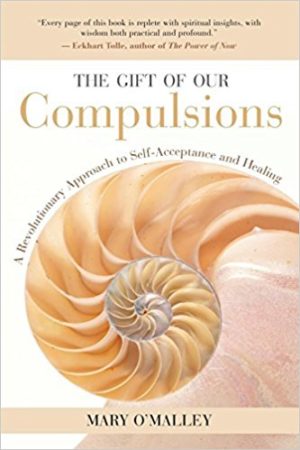
Nourishing Wisdom: A Mind-Body Approach to Nutrition and Well-Being by Marc David
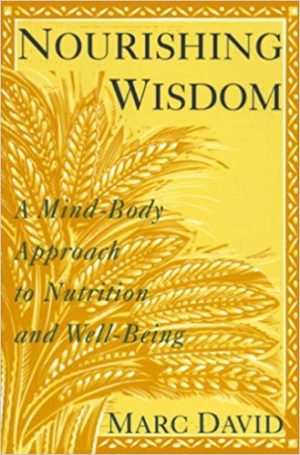

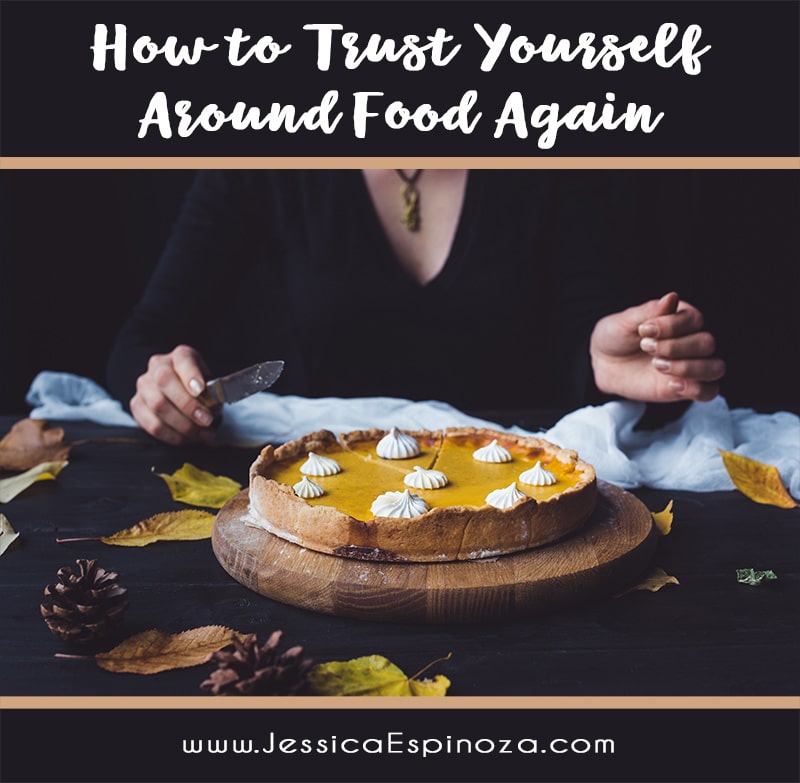
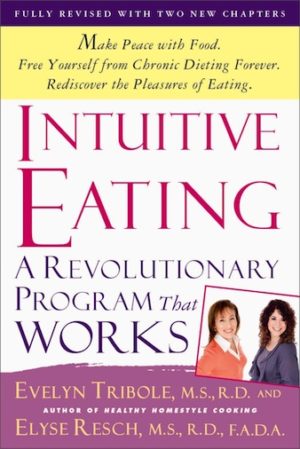 Click Here to Learn More
Click Here to Learn More